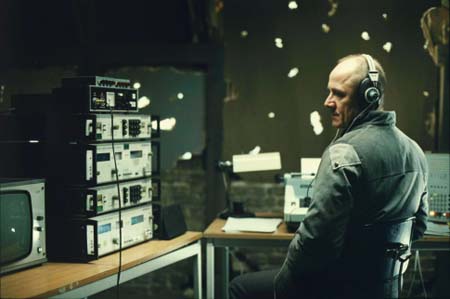
Thanks to the backlog created by getting sick, the holidays and my general apathy, I have made a promise to myself that I can’t rent any new movies until I finish posting the last three I saw. I also felt I should complete them before I get past the two-month mark, as my memory will fade. However, if you find these reviews worthless, you can say so in the Comments, otherwise silence ends up being “compliance.”
The previous paragraph now dovetails excellently into the movie’s subject matter, life in a police state and the people who do the dirty work to make it possible. Sadly, the key actor Ulrich Muhe died from stomach cancer last year, depriving him of all fame he could’ve gained in the English-speaking world for his performance. Muhe grew up in the oppressive nation and was spied upon more than the average German due to his profession. I think it made him quite attuned to the Staatssicherheit’s behavior. NPR’s Fresh Air got me interested in seeing this rather emotional, touching story when Gross interviewed the director Henckel von Donnersmarck. During the height of East Germany’s existence, the secret police employed almost 300,000 operatives to cover a population of 17 million, giving it the highest ratio of secret police-to-citizen in the Soviet Bloc. Doesn’t sound like much but to give you a better illustration, New York City has half the population and there are only 100,000 police officers to enforce the law. Thus, the legends of the Staatssicherheit being “everywhere” were pretty close to true.
Lives begins in the mid-Eighties with Captain Wiesler (Muhe) teaching an interrogation class. He’s a no-nonsense, by-the-book, inflexible hard-ass. Then his old classmate and Commander Grubitz invites him to see a play by Georg Dreyman (Koch from Black Book), a very pro-regime writer with friends in high places; this protects him for associating with other artists on the subversives list. Turns out Grubitz needs someone he implicitly trusts to monitor Dreyman and find just enough dirt on the intellectual to remove the protection of the powerful friends. Wiesler agrees to the assignment and cases Dreyman. At the first opportunity, Wiesler’s team enters Dreyman’s apartment and plants listening devices throughout with another demonstration of thoroughness, intimidation and efficiency after a neighbor is caught witnessing the handiwork. The spying then begins in earnest through a special room on the top floor giving total access to Dreyman’s phone, doorbell and entrance. What Grubitz didn’t count on was Wiesler’s detective skills: Dreyman is a high-priority surveillance case because his girlfriend, popular actress Christa-Maria Sieland, is in a love triangle with Minister Hempf (the equivalent of a cabinet member in the US government). Using State operatives and equipment to remove a romantic rival is against the ideals of the Party according to Wiesler. Confronted on this point, Grubitz tells him to see the silver lining: a grateful minister will promote both of them to better positions. Otherwise, obey these orders or else. Disillusioned, Wiesler faithfully carries out his duties for the next few weeks, while growing sympathetic to Dreyman until he can no longer be impartial and it alters his perspective on the regime.
Any further descriptions would spoil it. I will write this though. The bulk of the movie stays anchored in the mid-Eighties and when you think it’s over with the news of Gorbachev’s ascendency, it continues. First you see the characters reacting to the events of 1989 and then it concludes with their lives in the Nineties under a unified Germany.
Lives is pretty heavy. Definitely not a date flick, a diversion or a popcorn movie (what educated people call “terrible”). Yet it is the kind of movie I do like. Something thought provoking. Something to drum up a conversation, debate or argument about afterwards. I remembered the heated discussion at TGIFridays after seeing The Matrix or arguing on how Hollywood Shuffle really ended. I readily admit that Lives has formulaic elements but it triumphs in the execution of the acting; or I just can’t tell if someone is terrible in German.
